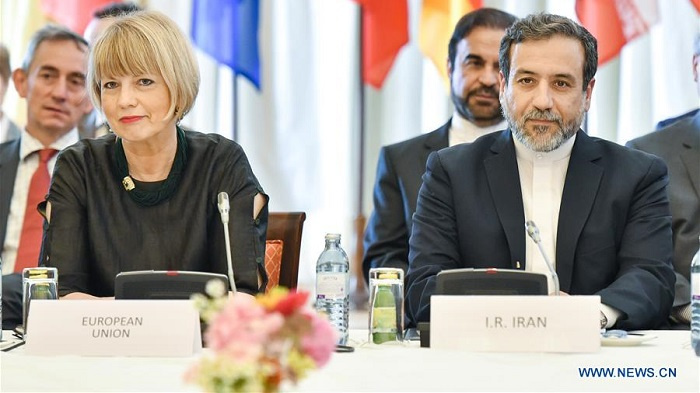The Survival of JCPOA Depends on EU

The IAEA reaffirmed Iran’s compliance with the nuclear a last week. There is speculation that Trump will be leaving the nuclear deal. Foreign Minister Zarif has reacted to the news of a US exit by saying: “Iran’s response to such a move will depend on the ‘behavior of the Europeans’.” He was referring to D’Amato in the 90s when the Europeans showed reluctance in supporting US sanctions against Iran and believes the EU does not have to choose between Iran and the US today. Nevertheless, Zarif emphasizes that ‘Iran leaving the JCPOA in case of a US withdrawal is an option that will always be on the table.’ Zarif says: “The US feels that if it imposes further sanctions on Iran or withdraws from the nuclear deal, it will only isolate itself.”
Jalil Bayat, reporter of Persia Digest, has conducted an interview on the future of the Iran nuclear deal with Dr. Trita Parsi, president of the National Iranian American Council and author of "Losing an Enemy - Obama, Iran and the Triumph of Diplomacy".
You can read the interview here:
Q: In your view, will Donald Trump leave the Iran nuclear deal in the same way he left the Trans-Pacific Partnership and Paris Agreement? Or are his verbal threats just that?
A: It looks increasingly likely that Trump will leave the nuclear deal, but it seems it will be done in such a way that the main argument will not be Iran violating the letter of the deal, but rather using the argument that Iran's regional policies change the context and make the nuclear deal unattractive from a US national interest perspective as it constrains America's ability to confront Iran in the region. It will still be a very difficult argument for the Trump Administration to make, but it seems to be the direction they have chosen to go.
Q: What will the consequences be for the US if it withdraws from the agreement? How will it impact international confidence in US commitments?
A: The rest of the world, with the exception of Israel and Saudi Arabia, will view such a move as tremendously negative and it will create a crisis. The United States will isolate itself, not just from China and Russia, but also from the European Union. However, it remains to be seen if Europe is capable of upholding its end of the bargain and protect its companies from future US sanctions. If it cannot, then it is likely that the deal will not survive.
Q: How will a US withdrawal from the deal, with no compelling reasons for it, affect the international Law of Treaties as well as the governing structure of the UN Security Council?
A: It will not affect international law, but it will certainly affect America's credibility. Future deals with the United States will be unattractive for many international players, mindful of the US's inability to uphold its obligations.
Q: What effective restrictions can Trump impose on Iran in case of a US withdrawal? As you are aware, in addition to a lack of political relations, there is also little economic relations between Iran and the US.
A: The US can once again make it very difficult for Iran to operate in international financial markets. Moreover, most US sanctions will not target Iran directly, but it will target other countries trading with Iran.
Q: How will the international community, especially banks, corporations, and financial institutions, react to the possible withdrawal of the US from JCPOA? Right now, many large banks are not willing to cooperate with Iran in fear of punitive actions by the US. If the US withdraws, will Iran's opportunities for economic growth and the normalization of its trade gained through JCPOA be limited again? FM Zarif has said what is important to us is that the US does not disturb our relations with the rest of the world.
A: This depends very much on the protection provided by Europe for the deal. If EU governments protect their companies and allow them to trade with Iran despite US sanctions, the deal can potentially survive. But many companies may still choose not to trade with Iran as they may lose access to the American market. As a result, an American withdrawal has a very high risk of precipitating a total collapse of the deal.
* This piece was originally published in Persia Digest.

